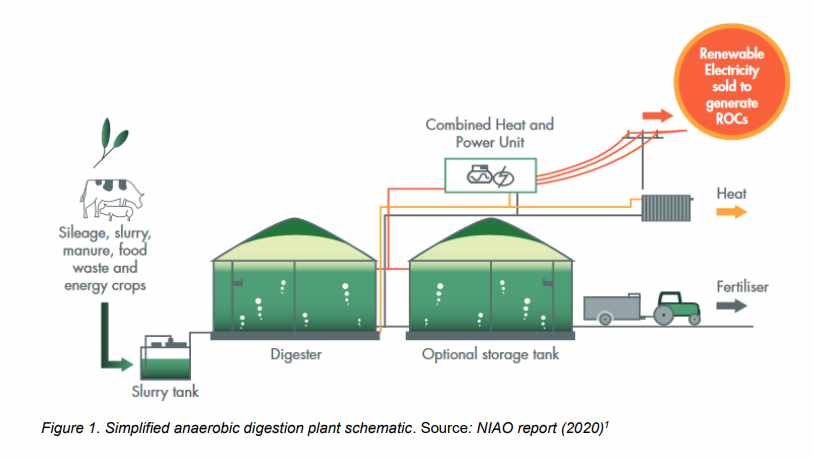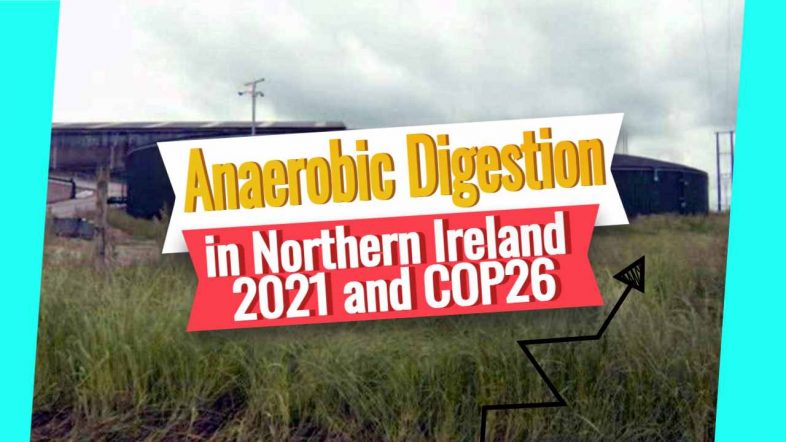Anaerobic digestion in Northern Ireland in 2022 looks set for a future of development, especially as we get close to COP26. After a period of low activity and some bad press, the mood is changing. There is no doubt that a huge potential exists for the Northern Ireland biogas industry.
Thanks for being with us online to read on for the good news!
Northern Ireland, like many other countries across the globe, is busily evaluating its climate objectives and the road map to reach them in the year that the UK hosts COP 26.
In October 2021 Northern Ireland's assembly was debating plans for the country's first Climate Change Bill, which would set an ambitious goal of net zero emissions by 2045. The majority of individuals will think that the sooner the better!
However, Agriculture and Environment Minister Edwin Poots spoke out against the bill, citing concerns about its impact on the agri-food sector. This is Northern Ireland's most polluting industry. Poots is thus developing separate legislation based on proposals from the Climate Change Committee, which has recommended a decrease of at least 80% of Northern Ireland's greenhouse gas emissions by 2050 as part of a larger UK objective of Net-Zero.
The two prospective legislation and related climate objectives have one thing in common: they cannot be met without Anaerobic Digestion and Biogas. So, as we've repeatedly stated, there is no net-zero without biogas.
Update May 2022: The Northern assembly has been dissolved while the EU Border Protocol and related issues are resolved. Hopefully, before long this will be resolved and once again the province will return to the pressing environmental issues for the implementation of COP26 goals.
The Case for Developing Anaerobic Digestion in Northern Ireland
This is especially simple to argue for Northern Ireland, considering that the four primary sources of greenhouse gas emissions are:
- Agriculture – which represents 27% of the country's total emissions: For example methane emissions from livestock and manures and other gases from chemical fertilizers
- Transport – which represents 23% of Northern Ireland's emissions: As you might guess, there's a pretty heavy reliance on-road use in the province.
- Energy – at 17%. By which we refer to the use of fuel to generate energy excluding transport
- Lastly residential use of fuel at 13%: by which we obviously mean the energy used in people's homes. In that sense, we're talking particularly about heating.
Together, they account for 80% of Northern Ireland's greenhouse gas emissions.
There is a much-maligned and underutilised technology available right now that could reduce that 80% right now.
The anaerobic digestion (AD) process, which generates biogas from which biomethane and carbon dioxide are produced, is a market-proven technology.
Yes. In contrast to batteries and hydrogen, it is a ready-to-use system that recycles methane-emitting organic wastes into:
- Biogas and
- Bio CO2, plus
- a rich nutrient biofertilizer digestate and
- other valuable bioproducts.
AD will play a critical role in decarbonizing all of these industries.
Northern Ireland has enormous potential that has yet to be realised.

Unlike the rest of the UK, for example, wastewater sludge is not yet processed and recycled by Anaerobic Digestion in Northern Ireland.
On the other hand, the vast agricultural and food manufacturing sectors are squandering a great potential to convert their organic wastes into valuable bioresources.
When employed appropriately, AD would also allow those industries to avoid the methane emissions now emitted by their organic wastes. Meanwhile, they are being recycled into energy that can be used to decarbonize their own activities.
The digestate might replenish soil nutrients and substitute chemical fertilisers.
Bio CO2 might also be harvested and utilised, notably in the food industry.
The good news is that biogas, specifically biogas converted to biomethane, has been highlighted as an essential component of Northern Ireland's future energy demands in the Northern Ireland Assembly's Energy Strategy.
The investigation report also recommends increasing injection into the natural gas supply grid and making compressed natural gas refuelling facilities more accessible on the gas network.
This storable, flexible green gas might aid in the decarbonization of Northern Ireland's gas grid and heavy freight trucks. However, the Granville Eco Park is now the province's only AD facility producing biomethane for grid injection.
Granville Eco Park likes to be the first in whatever they do. The injection of gas into the grid is not their only first. In addition, its AD facility was the first in the UK to be accredited under the AD Certification Scheme (ADCS).
This is an industry-led programme that recognises and encourages AD plant operational environmental, health, and safety excellence. It is critical to obtain certification.
The potential performance of on-farm anaerobic digestion in Northern Ireland
According to the ADBA abba's most recent study, “Biomethane the Pathway to 2030,” the AD industry has already reduced overall UK carbon dioxide emissions by more than 1%.
But why should we stop there?
It has the potential to produce an additional 5%, which is attainable by 2030.
To accomplish the remaining 5%, we will undoubtedly require a major commitment from the Northern Irish AD and biogas industries.
We must advocate for measures that will allow the province, and indeed the entire United Kingdom, to fulfil its full carbon-emissions potential this decade.

Trying to expand the AD and biogas industries in Northern Ireland and the UK as a whole. The need for this has never been greater!
I'm sure we're all aware that the IPCC 6th Assessment Report has issued the direst warning yet to world governments that we are running out of time to prevent a climate disaster.
We are now less than two months away from the UN Climate Summit Cop26, which will be co-hosted by the United Kingdom and Italy. Countries all across the world will have to commit to higher levels of climate ambition.
We all need them to agree to concrete plans to decarbonize their economies. By hosting the summit the UK is under great international pressure to take a leading role. The UK Government needs at least to show that it can achieve its own targets.
A comprehensive net-zero strategy will be published ahead of COP 26. All of those that support Anaerobic Digestion and Biogas need to keep engaging with the government to demonstrate the key role that our sector must play in the strategy.
Dear readers. You are voters!
Governments do listen to voters.
So I really do urge you to speak to your MP. Speak to your ministers if you can. Get them to understand the potential of biogas technology. Feel free to share the ADBA report “Biomethane the Pathway to 2030″ with them!
[soc_divider height=”5″ margin_top=”50″ margin_bottom=”50″ color=”#cc0000″]
Renewable Energy: Large subsidies not paid to ‘phantom' plants
BBC News has published an article that shows that the popular belief held in the province that AD plants are being subsidised at a cost added to domestic energy bills for heating barns, while the doors are held open, is a fallacy.
Payments to a mega farm in Northern Ireland that abused a green incentive for anaerobic digesters have been halted.
Northern Irish Anaerobic Digestion (AD) plants secure £10.5m investment
The SUPL SBRI Project and the SUPL Loan Scheme provided funding for the project's development.
It is an excellent example of the public and commercial sectors working together to develop new technology for sustainable agriculture while also growing our economy.
In addition to assisting the local poultry sector's growth, the facility will produce up to 100 employment during the building phase, with an additional 11 new positions available after the plant is operating in 2017.
This size of anaerobic digestion AD plant saves farming enterprises money and can offer crucial cash through the sale of the generated power (renewable electricity) or gas supplied into the gas grid.
Tyrone green energy plant ordered for removal by council officials
Bad publicity was received for the biogas industry when an agricultural biogas plant ran foul of planning requirements. This can occur in all industries.




